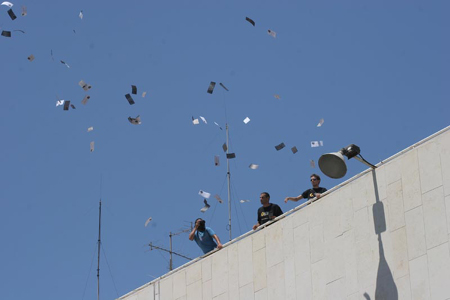Our region is engaged in another round of mindless violence. Thousands have abandoned their homes, many of which have been destroyed, and hundreds have been killed. As an organization working to change Jewish public consciousness, we realize that (like in the Nakba of 1948) although Israel is not solely responsible and at fault for the conflict, there is no doubt that Israel is stoking its flames by displaying violent and disproportional force and by causing most of the casualties – a majority of whom are civilians.
Nowadays, Israeli politics is driven by the desire for revenge. This desire, falsely dubbed the "restoration of deterrence capability" by some, in fact aims to restore the sense of chauvinistic, militaristic nationalism that was dealt a blow when IDF soldiers in the south and the north were taken captive. This desire for revenge drives a series of violent actions that are almost entirely without restraint. The Jewish-Israeli consensus on the street, in the political system and in the media celebrates alongside the IDF the opportunity to 'pulverize them,' as the news headlines cry. The nationalistic rhetoric advances the sense of victimhood and prevents any possibility for reasoned action or, heaven forbid, negotiations with the "aggressor."
On the other hand, it seems that few Israelis believe that military action, however violent, will end the conflict. Many citizens are sober enough to disbelieve those leaders who peddle peace like some kind of snake-oil. But if so, how can we really break out of the cycle of violence? For this we need to address the roots of the conflict, which continue to grasp the region until today.
The Israeli Palestinian conflict in its most violent form, as we have experienced it for many years, began with the Palestinian Nakba of 1948. Its ideological roots can be traced even earlier to the dawn of Zionism, but 1948 is the year that constituted the tragedy we are living through today. The Jewish state was established at the cost of destroying most Palestinian localities, uprooting most Palestinians from their homes and turning them into refugees. Still today, 70% of Palestinians are refugees in their country or in the diaspora.
The conflict that began with the Palestinian Nakba will not end until Jews begin to recognize the tragedy that took place in 1948, and the ruins on which the state was founded. We, Jews in Israel, must take responsibility for our part in the Palestinian Nakba and recognize the right of return for Palestinian refugees. Without these steps, there is no chance to achieve true peace between us and our neighbors.
Today, as in 1948, many are again abandoning their homes. Jews will be able to return to their homes when the battles end; Palestinians were not able to return in 1948 and many Lebanese will not have a home to return to. Perhaps if we begin to think about a shared life here for all the residents and refugees of the region, we will all be able to live in our homes peace.



